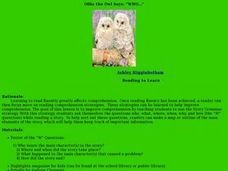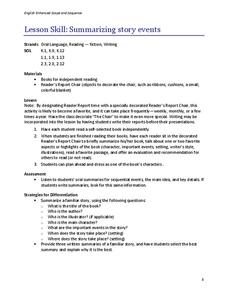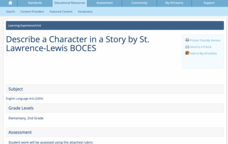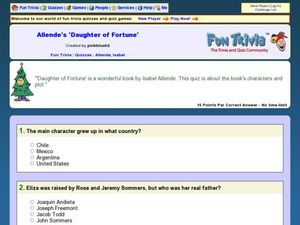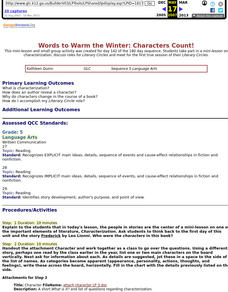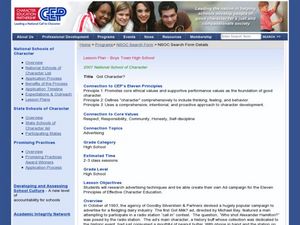Curated OER
Ollie the Own Says: WHO
Scholars examine the strategy of making a story map or outline to identify the main elements of a story. They discuss the who, what, where, when, why, and how of a story, in an outline form. As a class they read a short story, answer the...
Curated OER
Story Map for Crime and Punishment Part I, Chapters 1-5
While reading chapters one through five of Crime and Punishment, focus your readers with this guide. Eight questions are given here, encouraging the reader to study the protagonist and the struggles that ensue with the surrounding...
Curated OER
Summarizing Story Events
Here is a way to build your pupils' public speaking abilities. The lesson describes a reader's report chair, which is used each week by a student who has just finished reading a book. The featured reader sits in the chair and talks about...
Curated OER
Freak the Mighty: Chapter 18 Semantic Feature Analysis
Intelligent? Arrogant? Obnoxious? After completing Chapter 18 of Freak the Mighty, individuals fill out a semantic feature chart for characters in Rodman Philbrick's novel. Group members then use their charts to discuss relationships...
Curated OER
The Adventures of Huckleberry Finn: Semantic Feature Analysis
Racist, independent, conflicted? Readers of The Adventures of Huckleberry Finn brainstorm words that describe the traits of characters in Twain’s novel and then rate these qualities in several of their favorite characters. Individuals...
Curated OER
Wuthering Heights: Questioning Strategy
Readers of Wuthering Heights use the DRTA strategy to formulate predictions about the actions of characters in Bronte's novel.
Curated OER
Describe a Character in a Story
Second graders should be familiar with characters of a story and adjectives. The students should have some knowledge of Kidspiration. After reading a story, they will use Kidspiration and create a character web to describe a character in...
Curated OER
Allende's Daughter of Fortune
Test your readers' knowledge of Daughter of Fortune by Isabel Allende. The popular contemporary novel is based on the protagonist Eliza and her adventures. This quiz likewise focuses on the colorful characters and events in the novel.
Curated OER
Writing A Book Review of The Hobbit
Students explore The Hobbit by J.R.R. Tolkien. In this book review lesson, students examine the elements included in a book review, such as author, opinions of the book, summary, character information, main points and plot summary....
Curated OER
Map Making
Young scholars examine a variety of strategies to identify the structure of a story. They listen to the book Where the Wild Things Are and, as a class, complete a story element chart. Students independently read a passage from...
Curated OER
Information Problem Solving--Lesson 3 of 5
Students examine a selected story/book and practice identifying the setting, characterization, and plot. As a class, they identify problems in the story, turning points and the climax. They use a rubric to evaluate the story, as well.
Curated OER
The Secret Life of Walter Mitty Lesson Plan 3
Ninth graders read the story, "The Secret Life of Walter Mitty," and create a characterization chart to define the stock characters in the main story. They predict whether Walter Mitty will be a static character or a dynamic character....
Curated OER
Character and their Significance
Learners read short stories and write a response to the story about the character and their significance. In this character lesson plan, students also create a poster to represent their character.
Curated OER
Language Arts: Retelling Leo the Longhorn
Students reinforce sequencing skills by retelling stories. After being assigned roles in the production, they create dialog, props, and costumes for retelling the story "Leo the Longhorn." Working in cooperative groups, students may also...
Curated OER
Reader's Theater with a Twist
Second graders create a Reader's Theater script. In this reader's theater lesson plan, 2nd graders create their own script of a story in groups. They make props and act them out on FlipVideo and voice thread.
Curated OER
Letter Writing from a Different Perspective
Third graders write a letter from one character to another in a story they are reading. In this writing lesson plan, 3rd graders demonstrate their understanding of perspective.
Curated OER
Words to Warm the Winter: Characters Count!
Fifth graders take part in a mini-lesson on characterization, discuss roles for Literary Circles and meet for the first true session of their Literary Circles.
Curated OER
Farm Stories, Animal Webbing, Favorite Farm Animal Graph
Students brainstorm animals they would expect to see on a farm. They save these on a Kidspiration web. Students watch or read a farm story. They discuss the characters. Students vote for their favorite farm animal and crate a graph using...
Scholastic
Quick as a Cricket Lesson Plan
Teaching young learners about similes is easy as pie with this primary grade language arts instructional activity. Following a class reading of the children's book, Quick as a Cricket by Audrey Wood, young readers learn the definition of...
Curated OER
“The Story of an Hour” Extension Activities: Teacher’s Guide and Notes
Enhance and extend instruction of "The Story of an Hour" by Kate Chopin with one or all of these ideas. You might want to cover characterization and summary, or improve understanding of context clues and irony. You can cover any...
Curated OER
Got Character?
Students create an advertisement promoting good behavior. This character-development lesson plan from Boys Town High School involves students studying the history of the Got Milk?advertising campaign. After a discussion of marketing...
La Jolla High School
Of Mice and Men by John Steinbeck: Sketching a Portrait--Characterization
John Steinbeck's Of Mice and Men is known for rich character development. Expose your class to indirect characterization and all that it involves with this activity. Learners look at quotes, determine what method of characterization is...
Curated OER
Reading Study Guide: I Know Why the Caged Bird Sings
Meant for use with Maya Angelou's first autobiographical volume I Know Why the Caged Bird Sings, the materials here are designed for a homeschool setting, but they'd suit any classroom or text. Graphic organizers, chapter summary guides,...
Teachit
Keeping a Reader's Journal
A reader's journal can help pupils comprehend, connect to, and remember a text. Have them follow the prompts here to write journal entries for any literary text.
Other popular searches
- Setting Plot Main Characters
- Identify Main Characters
- Main Characters and Setting
- Main Character and Setting
- Identifying Main Characters
- Describing Main Characters
- Main Character Study
- Main Character Kindergarten
- Explaining Main Characters
- Defining Main Characters
- Developing a Main Character
- Reading for Main Character


